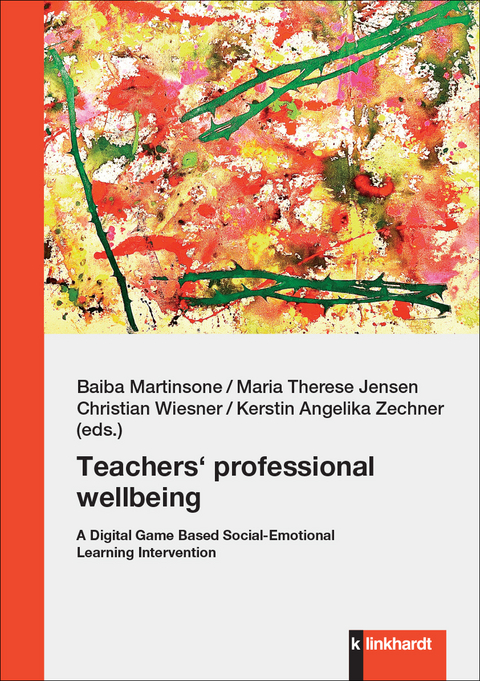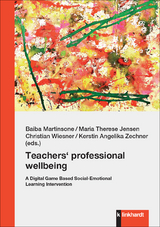Teachers‘ professional wellbeing
Verlag Julius Klinkhardt GmbH & Co. KG
978-3-7815-2636-5 (ISBN)
Using a mixed-methods research approach, digital interventions on wellbeing in several European countries were evaluated, which led to tailored policy recommendations for enhancing teacher professional development and mental health.
Teachers worldwide experience significant stress and burnout, impacting their health and the education systems. Recognizing the importance of social, prosocial, and emotional skills in education adds to this complexity. The European Policy Experimentation Project Teaching to Be (2021-2024) in Austria, Italy, Latvia, Lithuania, Norway, Portugal, Slovenia, and Spain, aimed to improve teacher wellbeing through innovative professional development. A digital game-based Online Wellbeing Course and a Teacher's Handbook were developed in the project to enhance various aspects of teachers' professional wellbeing and organizational health. Using a mixed-methods research approach, it evaluated digital interventions on wellbeing, leading to tailored policy recommendations for enhancing teacher professional development and mental health.
Martinsone, Baiba, Dr.psych., is a professor of Clinical psychology and senior researcher in Educational Psychology in the Department of Psychology at the University of Latvia. Her research interests within clinical and educational psychology include SEL, promoting mental health in schools, development and evaluation of universal prevention programs. She actively works in national and international research projects and publishes extensively in the field. Baiba is a member of the European Commission’s Expert Group on supportive learning environments for groups at risk of underachievement and for supporting well-being at school.
Jensen, Maria Therese, PhD, is a professor in psychology. She currently works at the National Reading Centre, University of Stavanger. Her main research fields are organizational psychology, educational psychology, and occupational health.
Wiesner, Christian, Prof. Mag. Mag. Dr., is a Professor of Educational Development and Relationship Pedagogy at the University College of Teacher Education Lower Austria in the Department of Diversity. His areas of work and research focus on didactic phenomena (teaching and learning cultures), being-in-relations and presence pedagogy, attachment theory, well-being as personal growth, educational diagnostics, competence – literacy – literacies, leadership culture, and evidence- oriented development.
Zechner, Kerstin Angelika, Prof. Mag. PaedDr. MA Bakk., studied Educational and Pedagogical Sciences, Social Pedagogy, Lifelong Learning, and Inclusive Education. She is the Head of the Department for Diversity and a Professor in the field of Diversity, School Climate, and Inclusive Pedagogy at the University College of Teacher Education Lower Austria. Her areas of expertise include Diversity, Inclusive Pedagogy, and Educational Equity.
Chapter 1 – Introduction
Christian Wiesner, Baiba Martinsone, Maria Therese Jensen
and Kerstin Angelika Zechner
Wellbeing in the teachers’ profession: Theoretical Considerations
and Multi-Cultural Research in Europe .............................................................9
Chapter 2 – Spain
Alba Merino-Cajaraville, Carlos Ramírez-Moreno, Irene García-Lázaro
and Salvador Reyes-de-Cózar
Defining a game-based learning proposal to work with teachers’
professional wellbeing: the Teaching to Be video game.....................................35
Chapter 3 – Latvia
Baiba Martinsone and Aija Vanaga
Approaching teachers’ professional wellbeing from different angles:
Teachers’ self-efficacy, burnout and resilience through participation
in the Online Wellbeing course........................................................................55
Chapter 4 – Portugal
José Reis-Jorge, Patrícia Pacheco, Marco Ferreira, Ana Barqueira
and Isabel Baltazar
School climate and teachers‘ professional wellbeing in Portugal:
A School Climate Analytical Framework (SCAF).............................................81
Chapter 5 – Norway
Kaja Lillelien, Trond Rekstad and Maria Therese Jensen
Developing and Implementing a Cross-Cultural Digital Intervention
on teachers‘ professional well-being in a Norwegian Context .........................107
Chapter 6 – Lithuania
Vilma Žydžiūnaitė and Aušra Rutkienė
Professional Burnout and its Relation to Self-Efficacy and Perceived Stress:
The Case of Lithuanian Teachers....................................................................127
Chapter 7 – Austria
Christian Wiesner, Kerstin Angelika Zechner, Sylvia Dörfler, Hannes Karrer
and Beate Schrank
Perspectives for unfolding well-being in the context of teacher education:
Emerging well-being Insights from Theoretical Austrian Traditions................159
Authors.......................................................................................................181
| Erscheinungsdatum | 02.04.2024 |
|---|---|
| Verlagsort | Bad Heilbrunn |
| Sprache | englisch |
| Maße | 148 x 210 mm |
| Themenwelt | Geisteswissenschaften ► Psychologie ► Pädagogische Psychologie |
| Sozialwissenschaften ► Pädagogik | |
| Schlagworte | Arbeitserleben • austria • being-in-relationship • being literary • being literate • Berufsbildung • Berufsphase • Burn-out • Burnout • cognitive well-being • competencies • Educational Psychology • educational video game • Emotional Well-Being • Erasmus KA3 project • Eudaimonic Well-Being • Europe • Game-based Learning • intentionality • Interaktionsdynamik • job demands resources theory • Kompetenzentwicklung • Latvia • Lehrerbildung • Lehrpersonen • Literacies • Lithuania • Mental Health • Multi-Cultural Research • Norway • Portugal • positive psychological functioning • professional wellbeing • Professionsforschung • program implementation • prosocial model • School Climate • School Climate Analytical Framework (SCAF) • Selbstwirksamkeitserwartungen • self-efficacy • Social and Emotional Learning • Social-Emotional Learning • Spain • Teachers • teachers' stress • Teaching to be • Unterrichtsforschung • Wellbeing • Wellness |
| ISBN-10 | 3-7815-2636-4 / 3781526364 |
| ISBN-13 | 978-3-7815-2636-5 / 9783781526365 |
| Zustand | Neuware |
| Haben Sie eine Frage zum Produkt? |
aus dem Bereich




